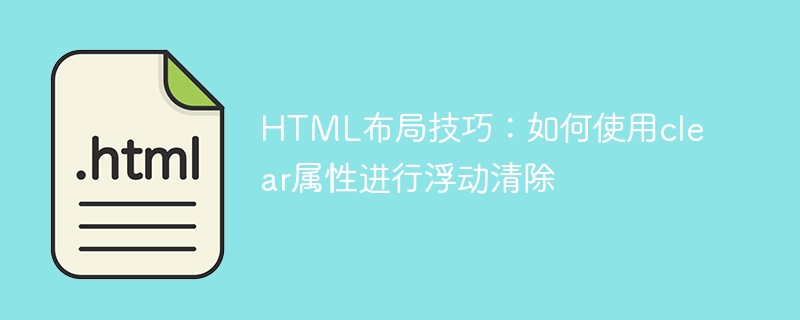Home >Web Front-end >HTML Tutorial >HTML layout tips: How to use the clear attribute for float clearing
HTML layout tips: How to use the clear attribute for float clearing
- 王林Original
- 2023-10-16 08:39:241647browse

HTML layout skills: How to use the clear attribute to clear floats, specific code examples are required
In web design, float (float) is a commonly used layout method , which enables elements to be aligned to the left or right on the page. However, when an element is floated, it will affect the layout of subsequent elements, causing layout confusion. To solve this problem, we can use the clear attribute to clear the float.
The clear attribute is used to specify that floating elements cannot appear on the left or right side of an element. When an element has the clear attribute set, it will stop floating to the left or right of the floated element and start aligning on a new line.
In HTML, we can use the clear attribute to clear floats in the following ways:
-
The value of the clear attribute is left
<div style="clear: left;"></div>
This will disallow floating elements to the left of the element, thus clearing the float.
-
Use the value of the clear attribute to right
<div style="clear: right;"></div>
This will not allow floating elements to appear on the right side of the element, thereby clearing the float.
-
Use the value of the clear attribute to both
<div style="clear: both;"></div>
This will not allow floating elements to appear on the left and right sides of the element, thereby clearing the float.
When we need to clear a series of floating elements, we can add a clearfix class to their parent elements and set the clear attribute in this class. Here is an example:
<style>
.clearfix:before,
.clearfix:after {
content: "";
display: table;
}
.clearfix:after {
clear: both;
}
.clearfix {
zoom: 1;
}
</style>
<div class="clearfix">
<div style="float: left; width: 50%; height: 200px; background-color: red;"></div>
<div style="float: right; width: 50%; height: 200px; background-color: blue;"></div>
</div>In this example, we add a clearfix class to the parent element and set the before and after pseudo-elements in the style. The before pseudo-element is used to clear the content before the float, and the after pseudo-element is used to clear the content after the float. At the same time, we set the zoom attribute on the clearfix class to be compatible with older versions of IE browsers.
Through the above code, we can see that the two floating div elements are aligned from the left and right sides of the web page respectively, without any impact on subsequent elements.
To sum up, using the clear attribute can easily clear floating elements and solve the problem of layout confusion caused by floating elements. We can set the value of the clear attribute to left, right or both as needed, or use the clearfix class for unified clearing. Of course, you can also make some extensions according to actual needs, such as adding dynamic effects, etc., to achieve better page layout.
HTML layout tips: Using the clear attribute for floating clearing can not only help us create a better web page layout, but also improve the user experience. I hope these code examples can be helpful to your layout work in actual development.
The above is the detailed content of HTML layout tips: How to use the clear attribute for float clearing. For more information, please follow other related articles on the PHP Chinese website!

